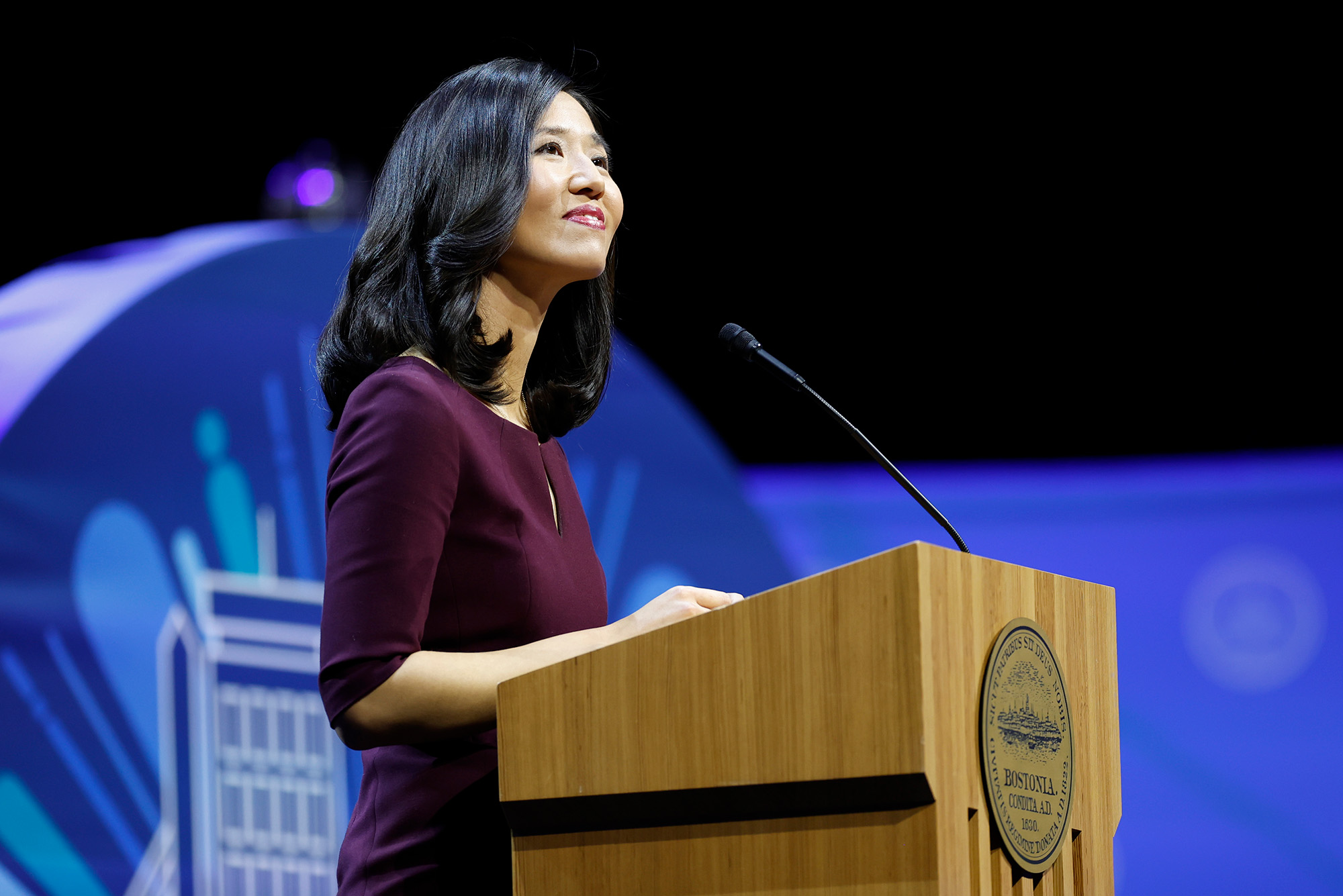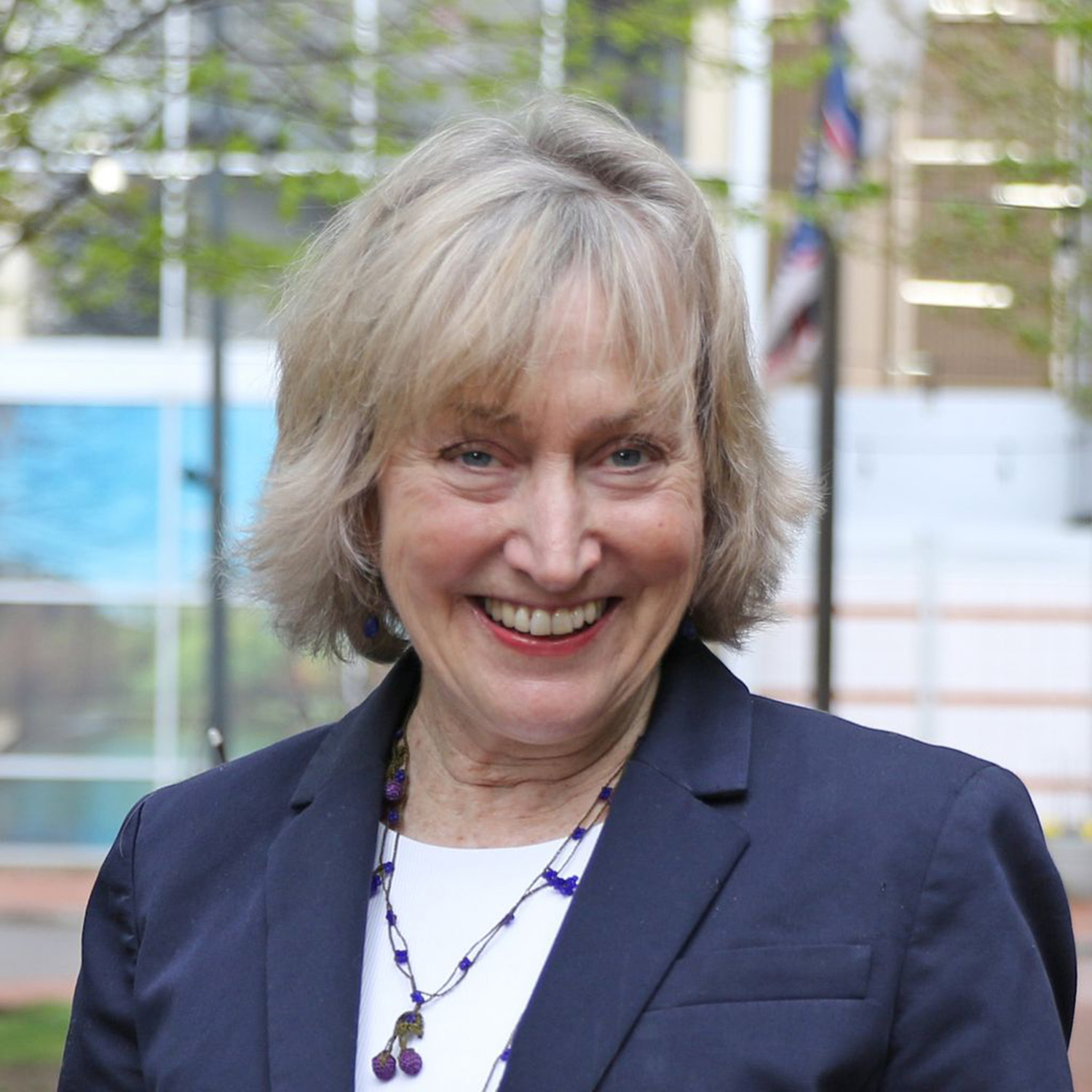Does It Matter if Boston Mayor Michelle Wu Doesn’t Take Maternity Leave?
Cofounder of BU Center of Excellence in Maternal & Child Health says the issue of women and maternity leave remains complicated

Boston Mayor Michelle Wu recently announced that she is pregnant—and that she has no plans to take maternity leave. Photo via Getty Images/Danielle Parhizkaran/The Boston Globe
Does It Matter if Boston Mayor Michelle Wu Doesn’t Take Maternity Leave?
Cofounder of the BU Center of Excellence in Maternal & Child Health says the issue of women and maternity leave remains complicated
Boston Mayor Michelle Wu is pregnant with her third child—a girl—due in January, which she announced in a statement late last month. Wu, who is 39, also stated that she had no intention of taking maternity leave.
“In the past, given the unique nature of my job, I have not taken leave,” Wu told reporters. “I have continued to, you know, certainly make adjustments to the job for physical health and recovery, but continue to be present for the community and often just kind of have the little one along with me for the ride, as we’ve experienced with my two boys.”
Her decision prompted a flurry of headlines: “Should Mayor Michelle Wu Take Maternity Leave?” and “Boston Mayor Michelle Wu Not Planning to Take Maternity Leave.”

The announcement by Wu, who has been a fierce advocate for extending parental rights to city employees, caught the attention of Lois McCloskey, who helped found the Center of Excellence in Maternal & Child Health at Boston University School of Public Health, which is celebrating its 30th anniversary this year. McCloskey, an SPH clinical professor of community health sciences, has been director of the center since 2010, and she says individuals make their own choices about maternity leave based on any number of factors, including income, job flexibility, and the role of a partner.
McCloskey spoke with BU Today about what researchers have learned over the years about maternity leave, how the United States handles maternity leave compared to other parts of the world, and why the issue often puts women in a no-win situation.
Q&A
with Lois McCloskey
BU Today: Can you first talk about what research has taught us about maternity leave?
McCloskey: We have found that it makes a very big difference for the mothers themselves. And for fathers when they are part of the picture. And for the children. The entire family is impacted in a very positive way, especially when there is paid leave, as well as job protection, which for some can be part of unpaid leave. When you look at the studies, evidence is robust.
For the mother herself, maternity leave can lower the risk of reported intimate partner violence. Perhaps most importantly, studies have found lowered rates of postpartum depression among mothers who have maternity leave benefits. Breastfeeding rates are higher, bonding is stronger, and mothers are more likely to seek and receive their own healthcare after birth.
BU Today: What about in other parts of the world? Are there lessons about parental leave that the United States can learn from other countries?
McCloskey: The United States is the only country in the OECD [Organisation for Economic Co-operation and Development, an international group of 38 developed, high-income countries] that doesn’t have some kind of paid, nationally supported maternity leave. But the amount of leave and who receives it is all over the map—some countries cover 10 or up to 18 weeks. In Bulgaria it is 58 weeks! Eastern European countries seem to be the most generous. But then you look at the fathers, and there is a lot of variation—some countries do not cover fathers at all, while others offer anywhere between 10 days and 3 months.
BU Today: Why do you think the United States lags behind other countries?
McCloskey: It comes back to individualism and the absence of a fundamental right to healthcare in our country. Working people, mothers especially, have a fundamental right to maternity leave in these countries, as well as to healthcare. It’s believed to be a social good. Here, there is a high value on productivity and individual responsibility, and leave is seen as an individual luxury rather than a social good.
BU Today: We tend to think that for many people, not taking a maternity leave is first and foremost a financial obligation, that they can’t afford to miss work. But the mayor is hardly alone in being someone who has financial means and yet still decided to not take a leave. What does that tell us?
McCloskey: There are two sides of the coin. The benefits we just talked about are profound for those who don’t have resources and have lower-income jobs and maybe not the protections others have. They tend to have physical and social disadvantages during pregnancy and are at higher risk for complications. Those who enter pregnancy with disadvantages are most likely to benefit from maternity leave.
Then we get to those who have a lot of resources and have the ability to choose whether to take a leave or not. Their choice can often come down to things like job flexibility. Having a very flexible job and high authority to make choices, like the mayor has, allows her and others to take their baby to work and experience the bonding with her baby while also continuing to work.
BU Today: Paternity leave has become more common and accepted, but you often hear men say that they cannot take the full leave they are entitled to. Is that the same individualism and value of productivity you mentioned?
McCloskey: Men need to be empowered to take their leave, but in terms of the larger society, it’s been a huge shift from the earlier generations.
BU Today: Is this an example where women like Mayor Wu are damned if they do, damned if they don’t?
McCloskey: In terms of social perception, I think women are between a rock and a hard place. I know [Mayor Wu] and others have critics who say she is putting work first, sending the wrong message. But then if you do take the leave, we know all about the larger built-in societal perceptions and risks for women: [people say] that you can’t hire too many women in their childbearing years; they will take too much time off and productivity at the office will suffer, and other people will have to step in.
BU Today: Are these some of the conversations and issues that the BU Center of Excellence in Maternal & Child Health tries to address?
McCloskey: We are primarily a center dedicated to offering enhanced education for the emerging workforce, particularly those who want to spend their careers working on behalf of mothers, infants, children, adolescents, and families overall. We’re celebrating our 30th anniversary this year. Funded by the Health Resources & Services Administration, we are all about diversifying and strengthening the workforce. We fund MPH students to gain research experience with faculty members and practice experience with community organizations, and we support students from BIPOC [Black, Indigenous, and people of color] and LGBTQIA+ communities to become leaders in their communities, offering mentorship, tuition support, and community-building opportunities.
BU Today: Where do you go from here?
McCloskey: In our next five years, we will expand our reach to bring together students and faculty from across the University to converge and work together to create solutions to the big problems—like inadequate housing and climate change—that have such a profound impact on maternal and child health.
Under the leadership of our new BU president [Melissa L. Gilliam], who, of course, is in our field [Gilliam is a physician, and a researcher in public health, medicine, and the humanities], I look forward to convening events and bringing scholars together across the University to get out of our silos and combine knowledge and creativity to address the core issues that have a disproportionate impact on women and children, especially of color. We already work closely with fellow faculty at the BU School of Law and the newly created BU Program on Reproductive Justice. We will spearhead more such collaborations across the University.
This interview has been condensed and edited for clarity.

Comments & Discussion
Boston University moderates comments to facilitate an informed, substantive, civil conversation. Abusive, profane, self-promotional, misleading, incoherent or off-topic comments will be rejected. Moderators are staffed during regular business hours (EST) and can only accept comments written in English. Statistics or facts must include a citation or a link to the citation.